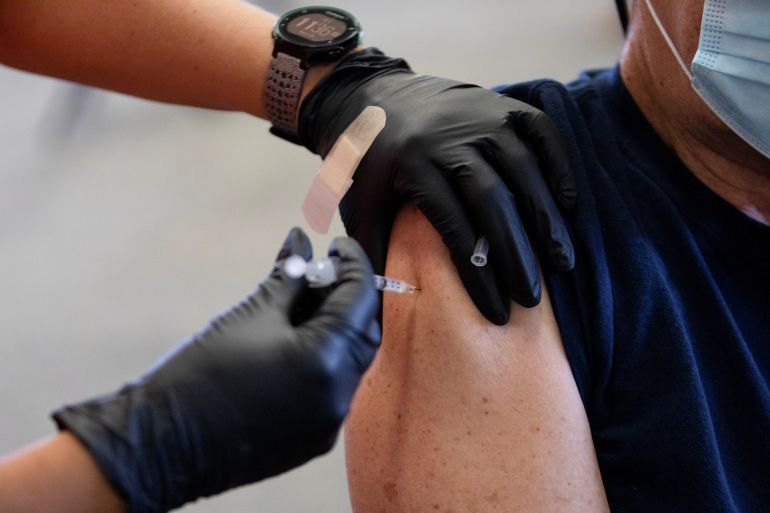Boosters give up to 75 percent protection from mild Omicron: UK
Initial real-world data shows that booster COVID-19 jabs protect people against mild disease from the Omicron variant.

Booster COVID-19 vaccine shots give an estimated 70 percent to 75 percent protection against mild disease from the new Omicron variant, according to the United Kingdom’s Health Security Agency (UKHSA), citing initial findings from a real-world study.
The findings released on Friday are some of the earliest data on the protection against Omicron outside of lab studies, which have shown reduced neutralising activity against Omicron.
Keep reading
list of 3 itemsBritish PM Johnson moves to COVID ‘Plan B’ to contain Omicron
WHO warns against rich nations hoarding jabs to fight Omicron
The early data suggest that while Omicron could greatly reduce protection against mild disease from an initial two-dose vaccination course, boosters restored the protection to an extent.
“These early estimates should be treated with caution but they indicate that a few months after the second jab, there is a greater risk of catching the Omicron variant compared to Delta strain,” Mary Ramsay, head of immunisation at the UKHSA said on Friday, adding that protection against severe disease was expected to remain higher.
“The data suggest this risk is significantly reduced following a booster vaccine, so I urge everyone to take up their booster when eligible.”
In an analysis of 581 people with confirmed Omicron, two doses of AstraZeneca and Pfizer-BioNTech vaccines provided much lower levels of protection against symptomatic infection compared with what they provide against the Delta variant of the coronavirus.
However, when boosted with a dose of Pfizer vaccine, there was about 70 percent protection against symptomatic infection for people who initially received AstraZeneca, and about 75 percent protection for those who received Pfizer.
That compares with estimated protection against infection from Delta following a booster of about 90 percent.
The agency also said scientists do not know how effective the vaccines will be in preventing severe disease in people exposed to the variant, though it is expected to be “significantly higher” than protection against mild infections.
On Thursday, the World Health Organization expressed concerns that rich countries spooked by the emergence of the Omicron variant could step up the hoarding of COVID-19 vaccines and strain global supplies again, complicating efforts to stamp out the pandemic.
The United Nations health agency, after a meeting of its expert panel on vaccination, reiterated its advice to governments against the widespread use of boosters in their populations so that well-stocked countries instead can send doses to low-income countries that have largely lacked access to them.
‘Tsunami of infections’
Meanwhile, in its latest variant technical briefing, UKHSA noted that new data from the country confirmed that Omicron is more easily transmissible than other variants.
At current trends, UKHSA said, Omicron would account for more than 50 percent of all COVID-19 infections by mid-December, with the UK exceeding one million infections by the end of the month.
On Friday, the UK reported the highest number of COVID infections since January, at 58,194. Communities Secretary Michael Gove said the country faces a “deeply concerning situation” as Omicron spreads rapidly, with case numbers doubling every two to three days in England.
“We know that we have the highest number of COVID infections across the UK recorded today since January 9,” when there were 59,937 cases, Gove told journalists after meeting leaders of UK regions.
He added that 30 percent of reported cases in London are now the Omicron variant, while the virus was only identified in the UK two weeks ago.
In Scotland, First Minister Nicola Sturgeon warned that “we may be facing – indeed we may be starting to experience – a potential tsunami of infections”.